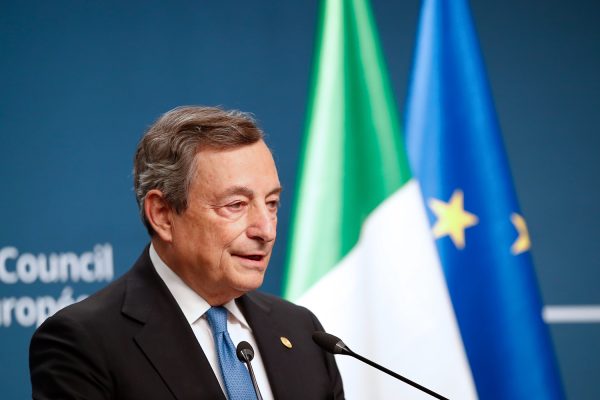
Matteo Salvini, the leader of Italy’s far-right League, visited the Polish-Ukrainian border this month to “help refugees.” But he made headlines for a different reason. In a video that went viral, Salvini could be seen squirming away from a news conference when the mayor of Przemyśl, a Polish town across the border from Lviv, taunted him with a T-shirt emblazoned with a visage of Salvini’s “friend,” Vladimir Putin. Salvini wore a similar shirt when he visited Moscow in 2014.
Salvini’s embarrassment is part of a broader blowback against Italy’s populist right over its cozy ties to Putin, one that could discredit the anti-American strain in Italian politics.
Misjudged
Right-wing parties in Italy were hardly alone in misjudging Putin, but they went the farthest in cultivating ties with Russia as an alternative to the American-led Atlantic alliance.
In 2014, Salvini’s then-Northern League created the Lombardy-Russia Cultural Association to promote bilateral relations. Publications aligned with the League as well as the left-populist Five Star Movement republished anti-American disinformation from Russian state-owned media.
When the League and Five Star Movement were able to form a government in 2018, Salvini, who served as interior minister, threatened to break with other European countries and the United States by vetoing sanctions imposed on Russia after its annexation of the Crimea.
Salvini left the government a year later.
Sympathies
Italian sympathies for Russia stem not only from the countries’ deep economic ties in areas like banking, energy and luxury goods, but also from idealized narratives about Russia on the left and the right.
During the Cold War, Italy’s Communist Party was the largest in Western Europe. Successor movements on the left have at times embraced Russia on the grounds that its soft power could balance American military might.
Certain strands of the Italian Catholic right see Putin as a bulwark against liberal American and European views on family and gender.
The fact that Italian governments have seldom echoed such sentiments, and that Italy has been a loyal ally to the United States, has blinded official Washington to the danger of anti-Americanism in Italy. At times of international tension, this undercurrent can force Italian leaders to spend significant political capital on maintaining the transatlantic relationship.
For example, in 2004, anti-Americanism rose to an estimated one-third of the population against the backdrop of Prime Minister Silvio Berlusconi’s support for the Iraq War. In more recent years, transatlantic cooperation was strained when Donald Trump’s approval ratings dipped even below Vladimir Putin’s.
Chance
Mario Draghi, the current prime minister, does not face such a skeptical public. Even the Russia-friendly right has disavowed Putin, giving Draghi a mandate to impose sanctions that hurt Italy’s own economy as well as Russia’s.
With the Italian public behind him — and Trump out of the White House — Draghi may even have a chance to deepen the American-Italian relationship.
